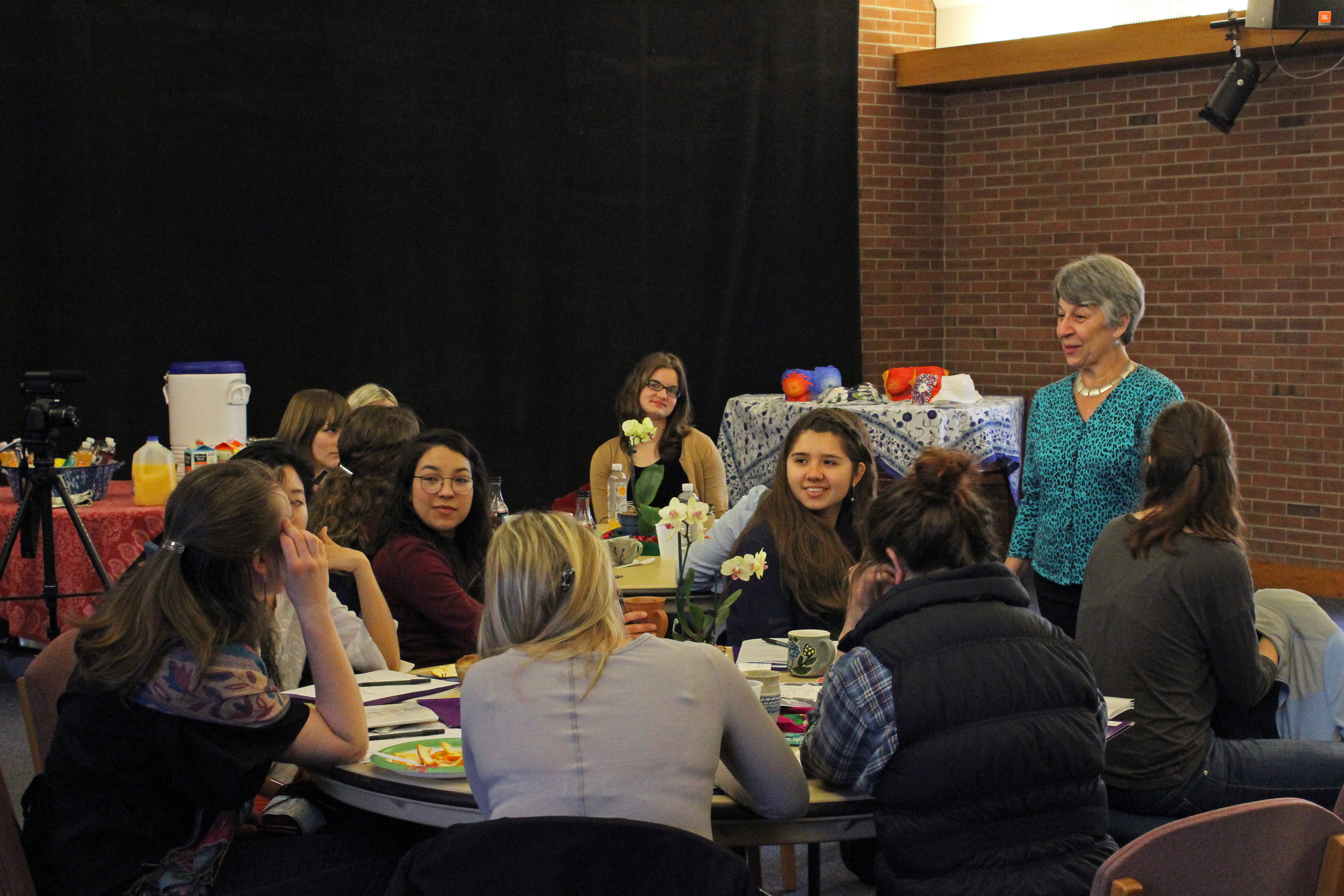On March 20 and 21, I participated in Sister Care at Goshen College. In a very general sense, Sister Care is a branch of Mennonite Women USA that travels locally—as well as globally—presenting women-specific seminars that focus on healing and care for women. The seminar I participated in, piloted by Goshen College, was the first Sister Care that was specifically aimed at college students. Carolyn Heggen and Rhoda Keener, the creators and organizers of the Sister Care seminars, led this weekend of seminars.
In many ways, my expectations for the weekend were both exceeded and dissatisfied.
I was welcomed into the seminar space with the friendly faces of other Goshen College woman, fresh fruit and freshly-made chai. I sat down at a table (which had been practically covered with chocolates) and, with growing excitement, waited for Keener and Heggen to begin.
On Friday night, the focus was on self-worth and body image. Heggen opened by emphasizing the values held by Sister Care, describing a Buddhist word: maître. This word means to have tender, loving compassion for ourselves, and served as the perfect segue to talk about body image.
Heggen emphasized that quite frequently, girls find joy in what their bodies can do; however, as women are continually sexualized by men, these feelings can quickly change into shame or fear of the body.
“Women go from feeling prideful and joyful of their bodies, and get the feeling that their bodies belong to males,” said Heggen.
Heggen also highlighted a concept she titled “self-bullying.” We are often over-critical of ourselves, insulting ourselves in ways we would never do to others.
“We say things to ourselves that I hope we would never say to a friend,” said Heggen, “I am saddened by how frequently women confuse themselves with their bodies.”
It was at this point that Heggen and Keener had us do two activities: a body prayer and a personal timeline. For myself, the timeline was one of my favorite parts of the entire weekend. We were told to place five different categories on a sheet of paper:
preschool, elementary school, middle school, high school and college. Under each category, we described how we felt about our bodies, how we were told to feel about our bodies, the joy we found within our body, and the hurt we found.
On Saturday, we explored the concept of healthy relationships. We looked at friendships as well as romantic relationships; most of the morning was spent talking about rape.
We watched a short clip from “Beyond the News: Sexual Abuse,” which told true experiences of date rape from both the female and male perspective. This led into what, in my opinion, was the most meaningful discussion of the entire weekend.
In this safe space created for us, we discussed how society views and reacts to rape victims. We discussed the policy on Goshen College’s campus, focusing specifically on the terminology used when dealing with a rape case (“complainant” and “respondent”). We discussed how there is lacking education of rape—especially with males. We also discussed how to forgive, without falling into what Keener described as the “forgiveness trap.”
From there, we moved onto stress and decision-making, which led to a section focused on us and our personal gifts and talents. We ended this section of Sister Care by taking some time for ourselves, listing our gifts, values, what we love doing, and our experiences.
“Life is like a jigsaw puzzle,” said Keener, “I’m terrible at jigsaw puzzles, but I know I have to start with the corners and work my way in.”
Sister Care ended as per its tradition, with a water ritual, a blessing that concludes every Sister Care seminar around the world.
Overall, I felt blessed to be a part of the weekend. The majority of Friday and Saturday involved a lot of sharing from Keener and Heggen, which left little time for discussion and sharing around the small group tables. Some of the information was irrelevant to me as a college-aged woman, and I would love to see them re-work the material even more, integrating more time for smaller discussions and more relevant topics. However, for the most part, I could resonate with almost everything that was explored during the weekend.
The community that blossomed from the weekend was fantastic. I was able to connect and have conversations with women that I knew, but may not have had the opportunity to spend as much time with without Sister Care. During meal times and breaks, we discussed issues on campus or international differences; conversations that I regard with high value and loved every second of.
Recently, I’ve been captivated by the phrase “life-giving.” The term insinuates acceptance, affirmation and worth. As a Mennonite, I aim to be spiritually life-giving; as a woman, I hope to embody this term not only for other women, but for myself as well.
I think Sister Care truly embodies the idea of being “life-giving.” The aim of the seminar is to provide women with the chance to heal themselves, something that I believe it does well.



